Understanding UK Legal System and Sources of Law
VerifiedAdded on 2023/06/06
|11
|3300
|58
AI Summary
This article provides an overview of the UK legal system, including classifications of law, sources of law, and the UK law making process for employment law. It explains the role of the High Court and Supreme Court in the English legal system, and the meaning and examples of delegated legislation. The article also covers the statutory duties of employers to their employees.
Contribute Materials
Your contribution can guide someone’s learning journey. Share your
documents today.
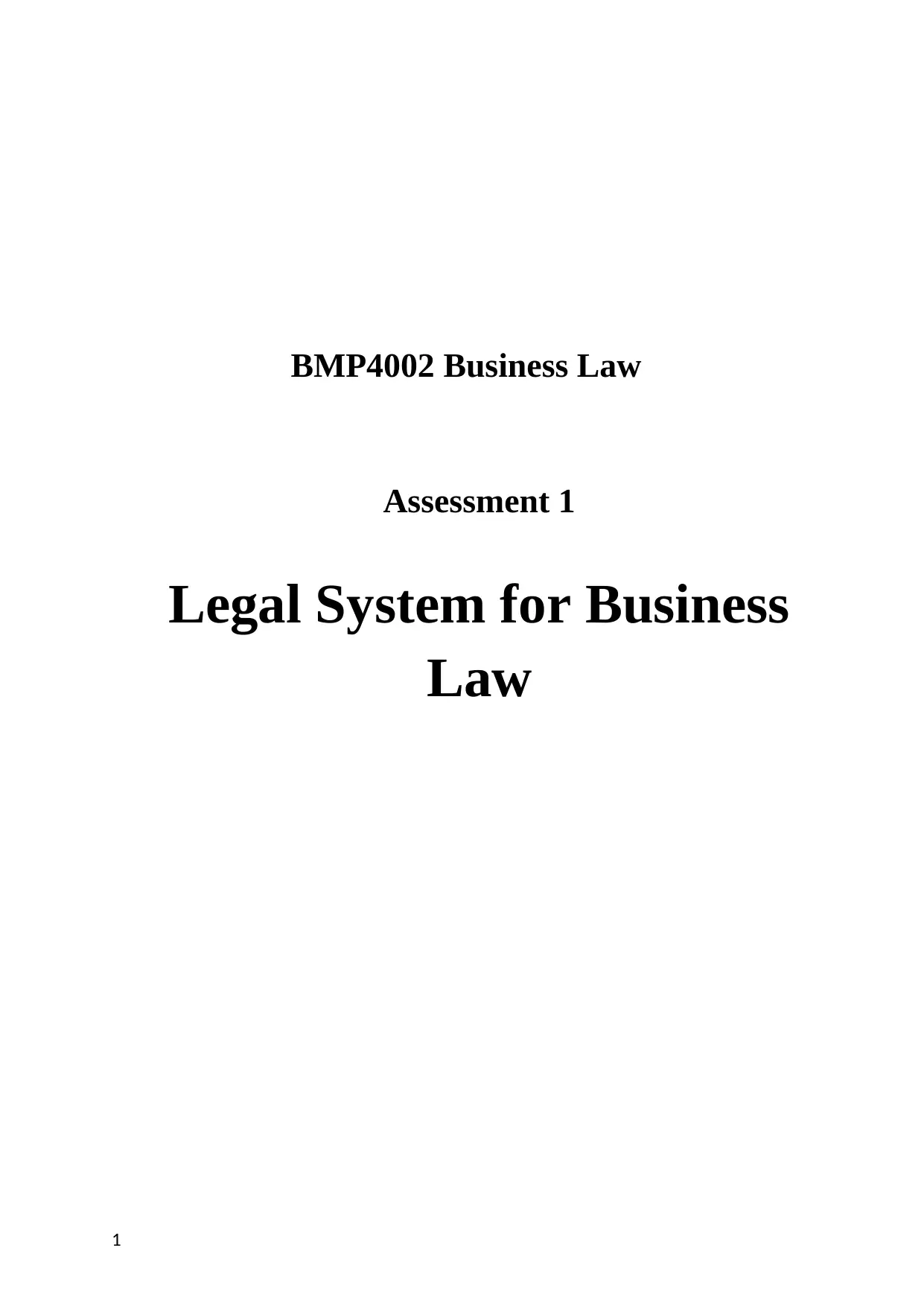
BMP4002 Business Law
Assessment 1
Legal System for Business
Law
1
Assessment 1
Legal System for Business
Law
1
Secure Best Marks with AI Grader
Need help grading? Try our AI Grader for instant feedback on your assignments.
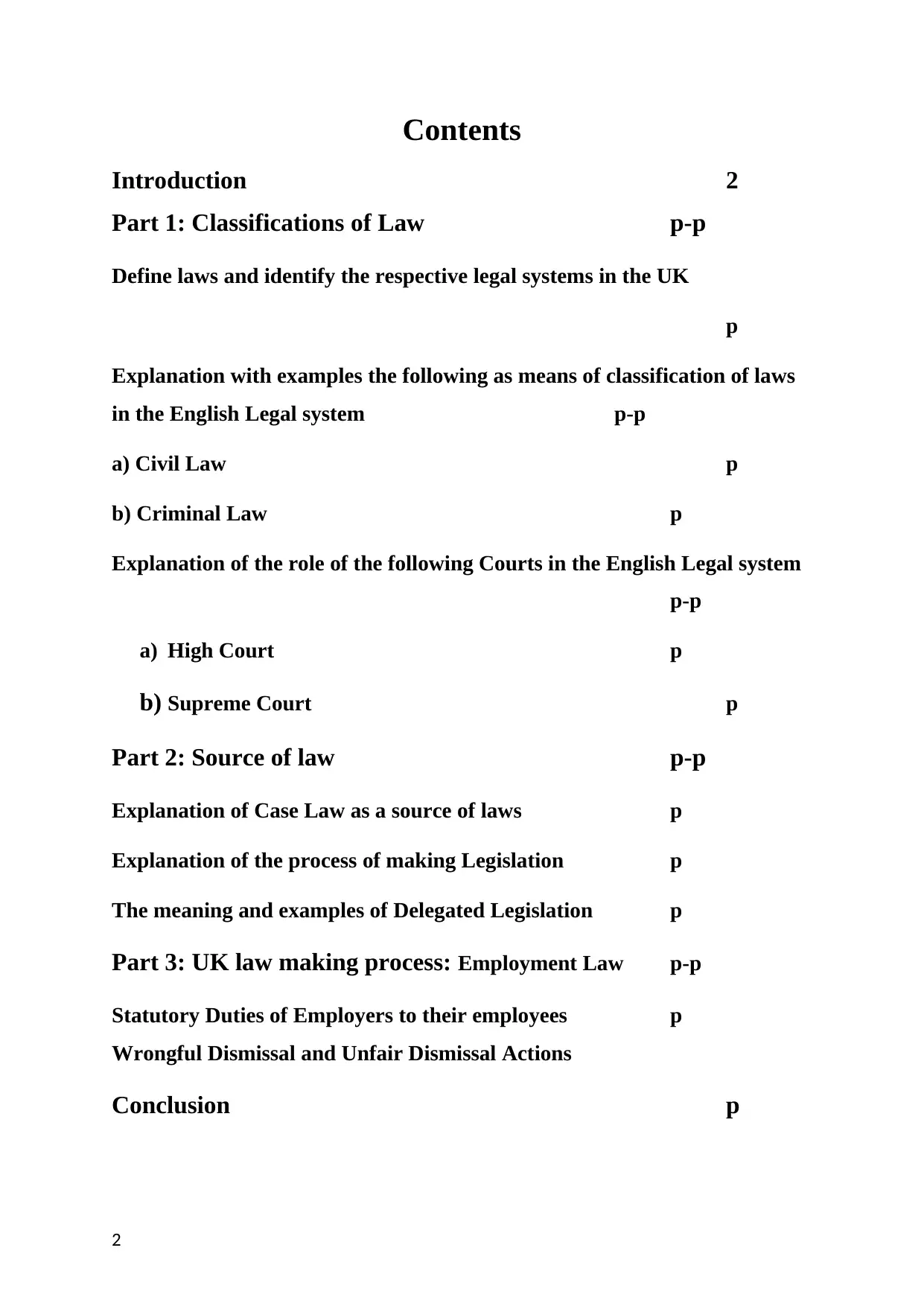
Contents
Introduction 2
Part 1: Classifications of Law p-p
Define laws and identify the respective legal systems in the UK
p
Explanation with examples the following as means of classification of laws
in the English Legal system p-p
a) Civil Law p
b) Criminal Law p
Explanation of the role of the following Courts in the English Legal system
p-p
a) High Court p
b) Supreme Court p
Part 2: Source of law p-p
Explanation of Case Law as a source of laws p
Explanation of the process of making Legislation p
The meaning and examples of Delegated Legislation p
Part 3: UK law making process: Employment Law p-p
Statutory Duties of Employers to their employees p
Wrongful Dismissal and Unfair Dismissal Actions
Conclusion p
2
Introduction 2
Part 1: Classifications of Law p-p
Define laws and identify the respective legal systems in the UK
p
Explanation with examples the following as means of classification of laws
in the English Legal system p-p
a) Civil Law p
b) Criminal Law p
Explanation of the role of the following Courts in the English Legal system
p-p
a) High Court p
b) Supreme Court p
Part 2: Source of law p-p
Explanation of Case Law as a source of laws p
Explanation of the process of making Legislation p
The meaning and examples of Delegated Legislation p
Part 3: UK law making process: Employment Law p-p
Statutory Duties of Employers to their employees p
Wrongful Dismissal and Unfair Dismissal Actions
Conclusion p
2

3
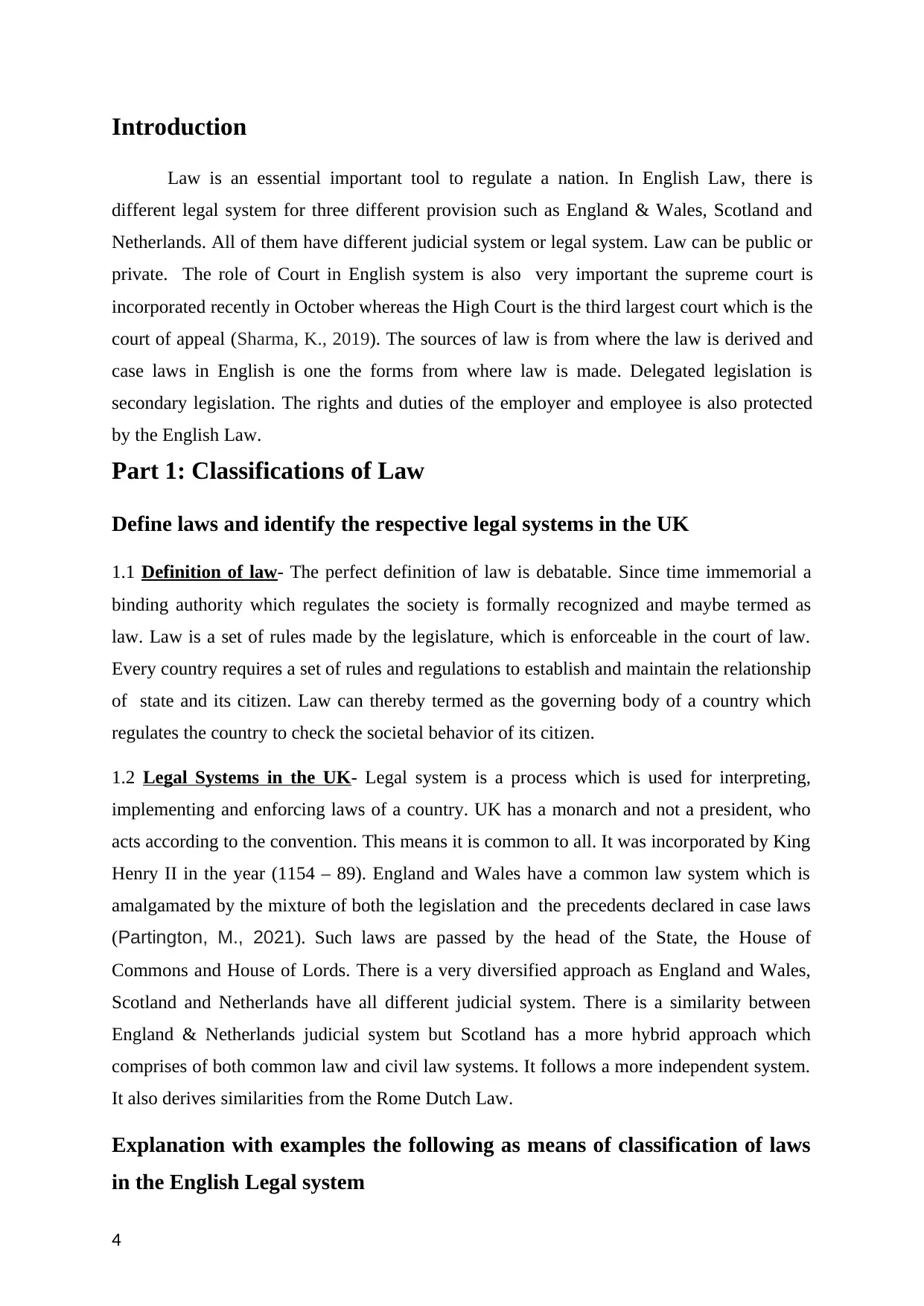
Introduction
Law is an essential important tool to regulate a nation. In English Law, there is
different legal system for three different provision such as England & Wales, Scotland and
Netherlands. All of them have different judicial system or legal system. Law can be public or
private. The role of Court in English system is also very important the supreme court is
incorporated recently in October whereas the High Court is the third largest court which is the
court of appeal (Sharma, K., 2019). The sources of law is from where the law is derived and
case laws in English is one the forms from where law is made. Delegated legislation is
secondary legislation. The rights and duties of the employer and employee is also protected
by the English Law.
Part 1: Classifications of Law
Define laws and identify the respective legal systems in the UK
1.1 Definition of law- The perfect definition of law is debatable. Since time immemorial a
binding authority which regulates the society is formally recognized and maybe termed as
law. Law is a set of rules made by the legislature, which is enforceable in the court of law.
Every country requires a set of rules and regulations to establish and maintain the relationship
of state and its citizen. Law can thereby termed as the governing body of a country which
regulates the country to check the societal behavior of its citizen.
1.2 Legal Systems in the UK- Legal system is a process which is used for interpreting,
implementing and enforcing laws of a country. UK has a monarch and not a president, who
acts according to the convention. This means it is common to all. It was incorporated by King
Henry II in the year (1154 – 89). England and Wales have a common law system which is
amalgamated by the mixture of both the legislation and the precedents declared in case laws
(Partington, M., 2021). Such laws are passed by the head of the State, the House of
Commons and House of Lords. There is a very diversified approach as England and Wales,
Scotland and Netherlands have all different judicial system. There is a similarity between
England & Netherlands judicial system but Scotland has a more hybrid approach which
comprises of both common law and civil law systems. It follows a more independent system.
It also derives similarities from the Rome Dutch Law.
Explanation with examples the following as means of classification of laws
in the English Legal system
4
Law is an essential important tool to regulate a nation. In English Law, there is
different legal system for three different provision such as England & Wales, Scotland and
Netherlands. All of them have different judicial system or legal system. Law can be public or
private. The role of Court in English system is also very important the supreme court is
incorporated recently in October whereas the High Court is the third largest court which is the
court of appeal (Sharma, K., 2019). The sources of law is from where the law is derived and
case laws in English is one the forms from where law is made. Delegated legislation is
secondary legislation. The rights and duties of the employer and employee is also protected
by the English Law.
Part 1: Classifications of Law
Define laws and identify the respective legal systems in the UK
1.1 Definition of law- The perfect definition of law is debatable. Since time immemorial a
binding authority which regulates the society is formally recognized and maybe termed as
law. Law is a set of rules made by the legislature, which is enforceable in the court of law.
Every country requires a set of rules and regulations to establish and maintain the relationship
of state and its citizen. Law can thereby termed as the governing body of a country which
regulates the country to check the societal behavior of its citizen.
1.2 Legal Systems in the UK- Legal system is a process which is used for interpreting,
implementing and enforcing laws of a country. UK has a monarch and not a president, who
acts according to the convention. This means it is common to all. It was incorporated by King
Henry II in the year (1154 – 89). England and Wales have a common law system which is
amalgamated by the mixture of both the legislation and the precedents declared in case laws
(Partington, M., 2021). Such laws are passed by the head of the State, the House of
Commons and House of Lords. There is a very diversified approach as England and Wales,
Scotland and Netherlands have all different judicial system. There is a similarity between
England & Netherlands judicial system but Scotland has a more hybrid approach which
comprises of both common law and civil law systems. It follows a more independent system.
It also derives similarities from the Rome Dutch Law.
Explanation with examples the following as means of classification of laws
in the English Legal system
4
Secure Best Marks with AI Grader
Need help grading? Try our AI Grader for instant feedback on your assignments.
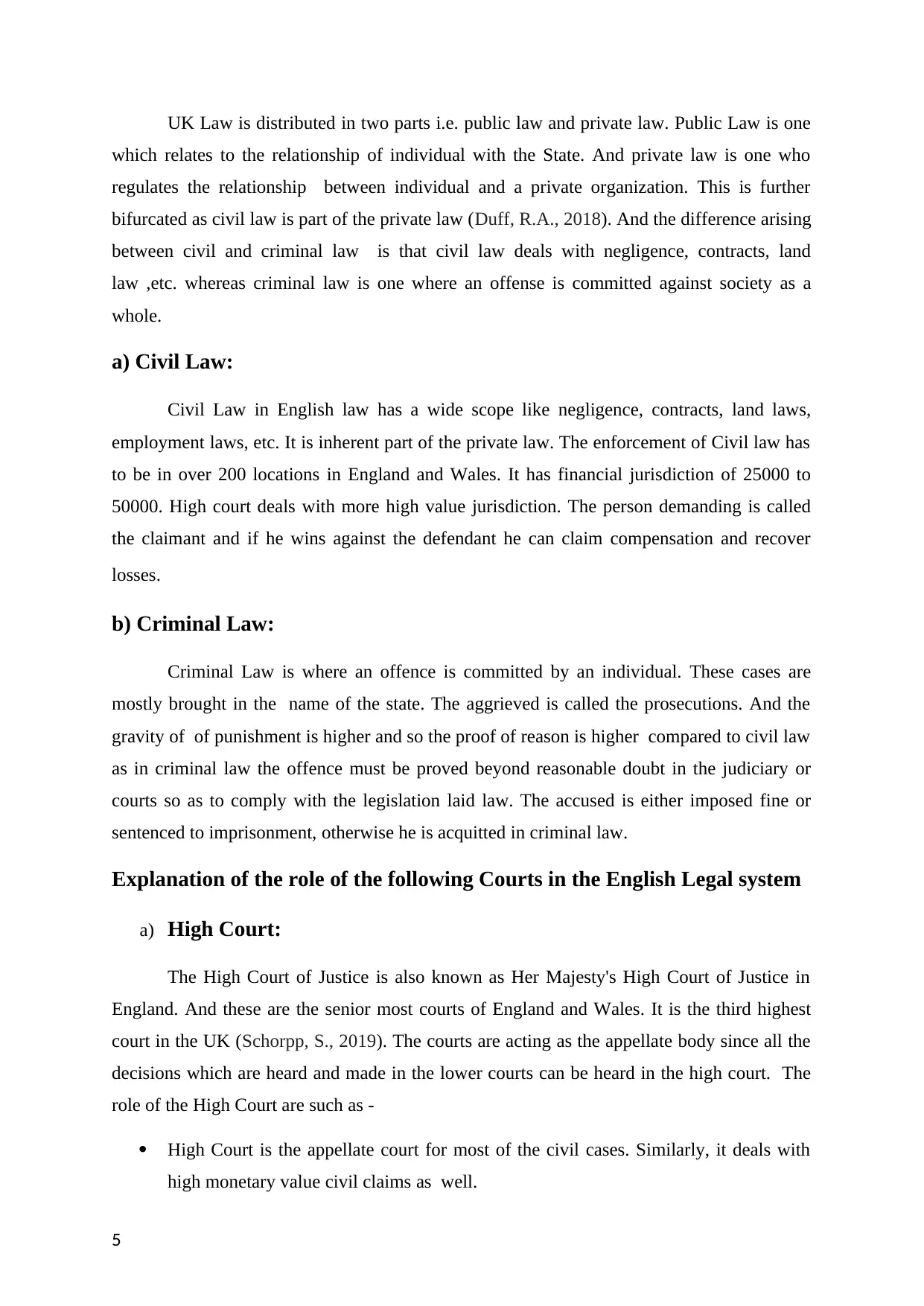
UK Law is distributed in two parts i.e. public law and private law. Public Law is one
which relates to the relationship of individual with the State. And private law is one who
regulates the relationship between individual and a private organization. This is further
bifurcated as civil law is part of the private law (Duff, R.A., 2018). And the difference arising
between civil and criminal law is that civil law deals with negligence, contracts, land
law ,etc. whereas criminal law is one where an offense is committed against society as a
whole.
a) Civil Law:
Civil Law in English law has a wide scope like negligence, contracts, land laws,
employment laws, etc. It is inherent part of the private law. The enforcement of Civil law has
to be in over 200 locations in England and Wales. It has financial jurisdiction of 25000 to
50000. High court deals with more high value jurisdiction. The person demanding is called
the claimant and if he wins against the defendant he can claim compensation and recover
losses.
b) Criminal Law:
Criminal Law is where an offence is committed by an individual. These cases are
mostly brought in the name of the state. The aggrieved is called the prosecutions. And the
gravity of of punishment is higher and so the proof of reason is higher compared to civil law
as in criminal law the offence must be proved beyond reasonable doubt in the judiciary or
courts so as to comply with the legislation laid law. The accused is either imposed fine or
sentenced to imprisonment, otherwise he is acquitted in criminal law.
Explanation of the role of the following Courts in the English Legal system
a) High Court:
The High Court of Justice is also known as Her Majesty's High Court of Justice in
England. And these are the senior most courts of England and Wales. It is the third highest
court in the UK (Schorpp, S., 2019). The courts are acting as the appellate body since all the
decisions which are heard and made in the lower courts can be heard in the high court. The
role of the High Court are such as -
High Court is the appellate court for most of the civil cases. Similarly, it deals with
high monetary value civil claims as well.
5
which relates to the relationship of individual with the State. And private law is one who
regulates the relationship between individual and a private organization. This is further
bifurcated as civil law is part of the private law (Duff, R.A., 2018). And the difference arising
between civil and criminal law is that civil law deals with negligence, contracts, land
law ,etc. whereas criminal law is one where an offense is committed against society as a
whole.
a) Civil Law:
Civil Law in English law has a wide scope like negligence, contracts, land laws,
employment laws, etc. It is inherent part of the private law. The enforcement of Civil law has
to be in over 200 locations in England and Wales. It has financial jurisdiction of 25000 to
50000. High court deals with more high value jurisdiction. The person demanding is called
the claimant and if he wins against the defendant he can claim compensation and recover
losses.
b) Criminal Law:
Criminal Law is where an offence is committed by an individual. These cases are
mostly brought in the name of the state. The aggrieved is called the prosecutions. And the
gravity of of punishment is higher and so the proof of reason is higher compared to civil law
as in criminal law the offence must be proved beyond reasonable doubt in the judiciary or
courts so as to comply with the legislation laid law. The accused is either imposed fine or
sentenced to imprisonment, otherwise he is acquitted in criminal law.
Explanation of the role of the following Courts in the English Legal system
a) High Court:
The High Court of Justice is also known as Her Majesty's High Court of Justice in
England. And these are the senior most courts of England and Wales. It is the third highest
court in the UK (Schorpp, S., 2019). The courts are acting as the appellate body since all the
decisions which are heard and made in the lower courts can be heard in the high court. The
role of the High Court are such as -
High Court is the appellate court for most of the civil cases. Similarly, it deals with
high monetary value civil claims as well.
5
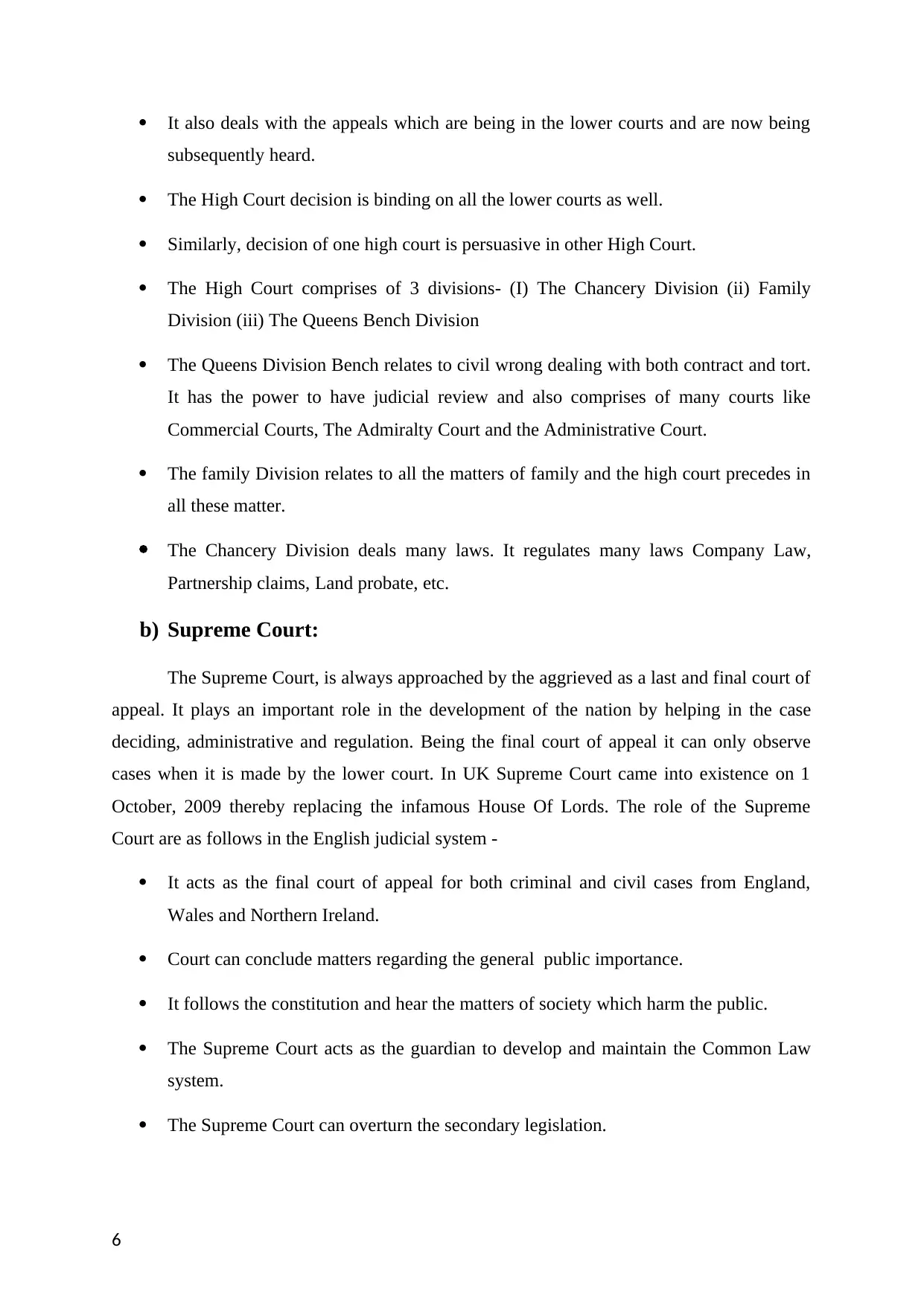
It also deals with the appeals which are being in the lower courts and are now being
subsequently heard.
The High Court decision is binding on all the lower courts as well.
Similarly, decision of one high court is persuasive in other High Court.
The High Court comprises of 3 divisions- (I) The Chancery Division (ii) Family
Division (iii) The Queens Bench Division
The Queens Division Bench relates to civil wrong dealing with both contract and tort.
It has the power to have judicial review and also comprises of many courts like
Commercial Courts, The Admiralty Court and the Administrative Court.
The family Division relates to all the matters of family and the high court precedes in
all these matter.
The Chancery Division deals many laws. It regulates many laws Company Law,
Partnership claims, Land probate, etc.
b) Supreme Court:
The Supreme Court, is always approached by the aggrieved as a last and final court of
appeal. It plays an important role in the development of the nation by helping in the case
deciding, administrative and regulation. Being the final court of appeal it can only observe
cases when it is made by the lower court. In UK Supreme Court came into existence on 1
October, 2009 thereby replacing the infamous House Of Lords. The role of the Supreme
Court are as follows in the English judicial system -
It acts as the final court of appeal for both criminal and civil cases from England,
Wales and Northern Ireland.
Court can conclude matters regarding the general public importance.
It follows the constitution and hear the matters of society which harm the public.
The Supreme Court acts as the guardian to develop and maintain the Common Law
system.
The Supreme Court can overturn the secondary legislation.
6
subsequently heard.
The High Court decision is binding on all the lower courts as well.
Similarly, decision of one high court is persuasive in other High Court.
The High Court comprises of 3 divisions- (I) The Chancery Division (ii) Family
Division (iii) The Queens Bench Division
The Queens Division Bench relates to civil wrong dealing with both contract and tort.
It has the power to have judicial review and also comprises of many courts like
Commercial Courts, The Admiralty Court and the Administrative Court.
The family Division relates to all the matters of family and the high court precedes in
all these matter.
The Chancery Division deals many laws. It regulates many laws Company Law,
Partnership claims, Land probate, etc.
b) Supreme Court:
The Supreme Court, is always approached by the aggrieved as a last and final court of
appeal. It plays an important role in the development of the nation by helping in the case
deciding, administrative and regulation. Being the final court of appeal it can only observe
cases when it is made by the lower court. In UK Supreme Court came into existence on 1
October, 2009 thereby replacing the infamous House Of Lords. The role of the Supreme
Court are as follows in the English judicial system -
It acts as the final court of appeal for both criminal and civil cases from England,
Wales and Northern Ireland.
Court can conclude matters regarding the general public importance.
It follows the constitution and hear the matters of society which harm the public.
The Supreme Court acts as the guardian to develop and maintain the Common Law
system.
The Supreme Court can overturn the secondary legislation.
6
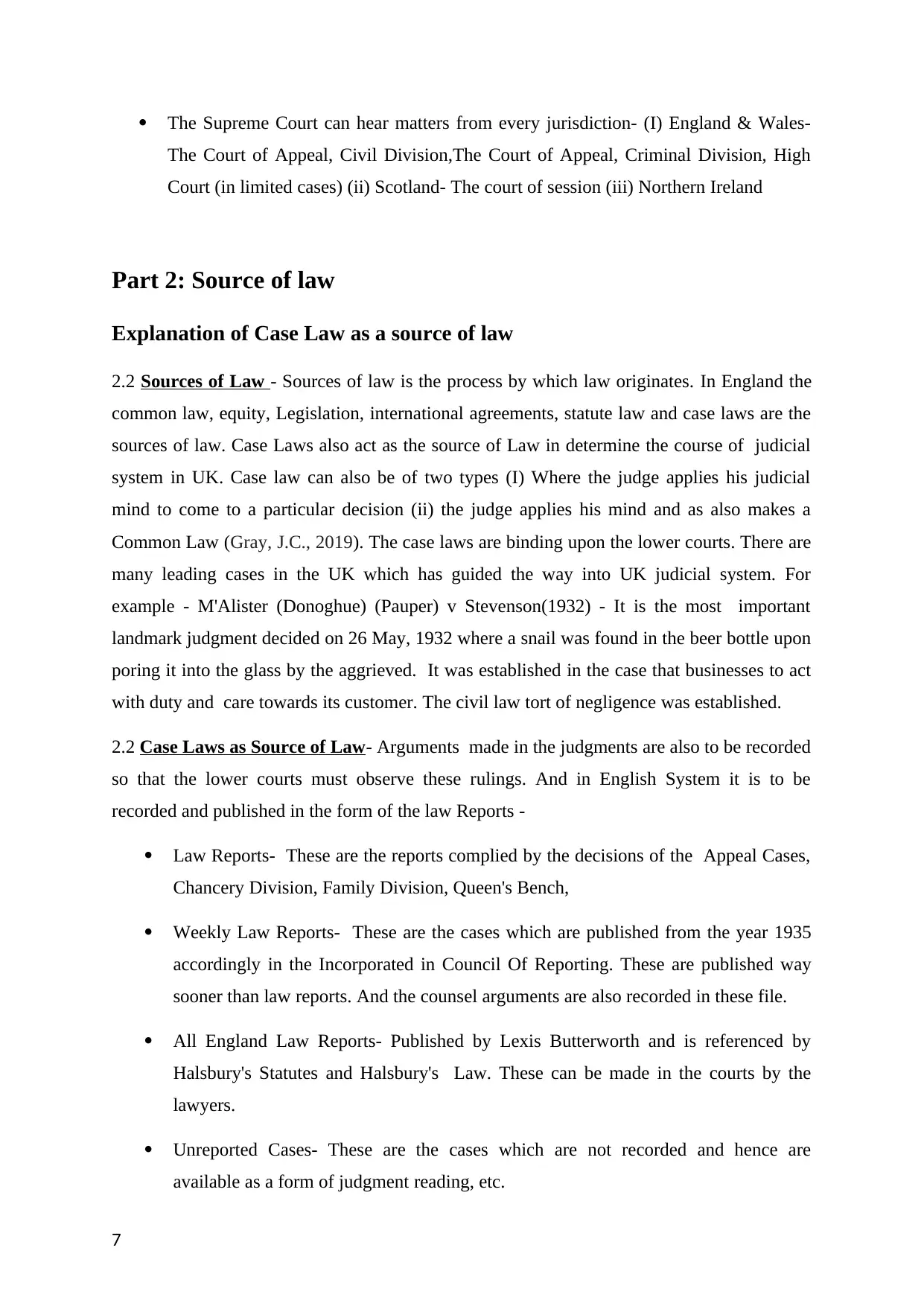
The Supreme Court can hear matters from every jurisdiction- (I) England & Wales-
The Court of Appeal, Civil Division,The Court of Appeal, Criminal Division, High
Court (in limited cases) (ii) Scotland- The court of session (iii) Northern Ireland
Part 2: Source of law
Explanation of Case Law as a source of law
2.2 Sources of Law - Sources of law is the process by which law originates. In England the
common law, equity, Legislation, international agreements, statute law and case laws are the
sources of law. Case Laws also act as the source of Law in determine the course of judicial
system in UK. Case law can also be of two types (I) Where the judge applies his judicial
mind to come to a particular decision (ii) the judge applies his mind and as also makes a
Common Law (Gray, J.C., 2019). The case laws are binding upon the lower courts. There are
many leading cases in the UK which has guided the way into UK judicial system. For
example - M'Alister (Donoghue) (Pauper) v Stevenson(1932) - It is the most important
landmark judgment decided on 26 May, 1932 where a snail was found in the beer bottle upon
poring it into the glass by the aggrieved. It was established in the case that businesses to act
with duty and care towards its customer. The civil law tort of negligence was established.
2.2 Case Laws as Source of Law- Arguments made in the judgments are also to be recorded
so that the lower courts must observe these rulings. And in English System it is to be
recorded and published in the form of the law Reports -
Law Reports- These are the reports complied by the decisions of the Appeal Cases,
Chancery Division, Family Division, Queen's Bench,
Weekly Law Reports- These are the cases which are published from the year 1935
accordingly in the Incorporated in Council Of Reporting. These are published way
sooner than law reports. And the counsel arguments are also recorded in these file.
All England Law Reports- Published by Lexis Butterworth and is referenced by
Halsbury's Statutes and Halsbury's Law. These can be made in the courts by the
lawyers.
Unreported Cases- These are the cases which are not recorded and hence are
available as a form of judgment reading, etc.
7
The Court of Appeal, Civil Division,The Court of Appeal, Criminal Division, High
Court (in limited cases) (ii) Scotland- The court of session (iii) Northern Ireland
Part 2: Source of law
Explanation of Case Law as a source of law
2.2 Sources of Law - Sources of law is the process by which law originates. In England the
common law, equity, Legislation, international agreements, statute law and case laws are the
sources of law. Case Laws also act as the source of Law in determine the course of judicial
system in UK. Case law can also be of two types (I) Where the judge applies his judicial
mind to come to a particular decision (ii) the judge applies his mind and as also makes a
Common Law (Gray, J.C., 2019). The case laws are binding upon the lower courts. There are
many leading cases in the UK which has guided the way into UK judicial system. For
example - M'Alister (Donoghue) (Pauper) v Stevenson(1932) - It is the most important
landmark judgment decided on 26 May, 1932 where a snail was found in the beer bottle upon
poring it into the glass by the aggrieved. It was established in the case that businesses to act
with duty and care towards its customer. The civil law tort of negligence was established.
2.2 Case Laws as Source of Law- Arguments made in the judgments are also to be recorded
so that the lower courts must observe these rulings. And in English System it is to be
recorded and published in the form of the law Reports -
Law Reports- These are the reports complied by the decisions of the Appeal Cases,
Chancery Division, Family Division, Queen's Bench,
Weekly Law Reports- These are the cases which are published from the year 1935
accordingly in the Incorporated in Council Of Reporting. These are published way
sooner than law reports. And the counsel arguments are also recorded in these file.
All England Law Reports- Published by Lexis Butterworth and is referenced by
Halsbury's Statutes and Halsbury's Law. These can be made in the courts by the
lawyers.
Unreported Cases- These are the cases which are not recorded and hence are
available as a form of judgment reading, etc.
7
Paraphrase This Document
Need a fresh take? Get an instant paraphrase of this document with our AI Paraphraser
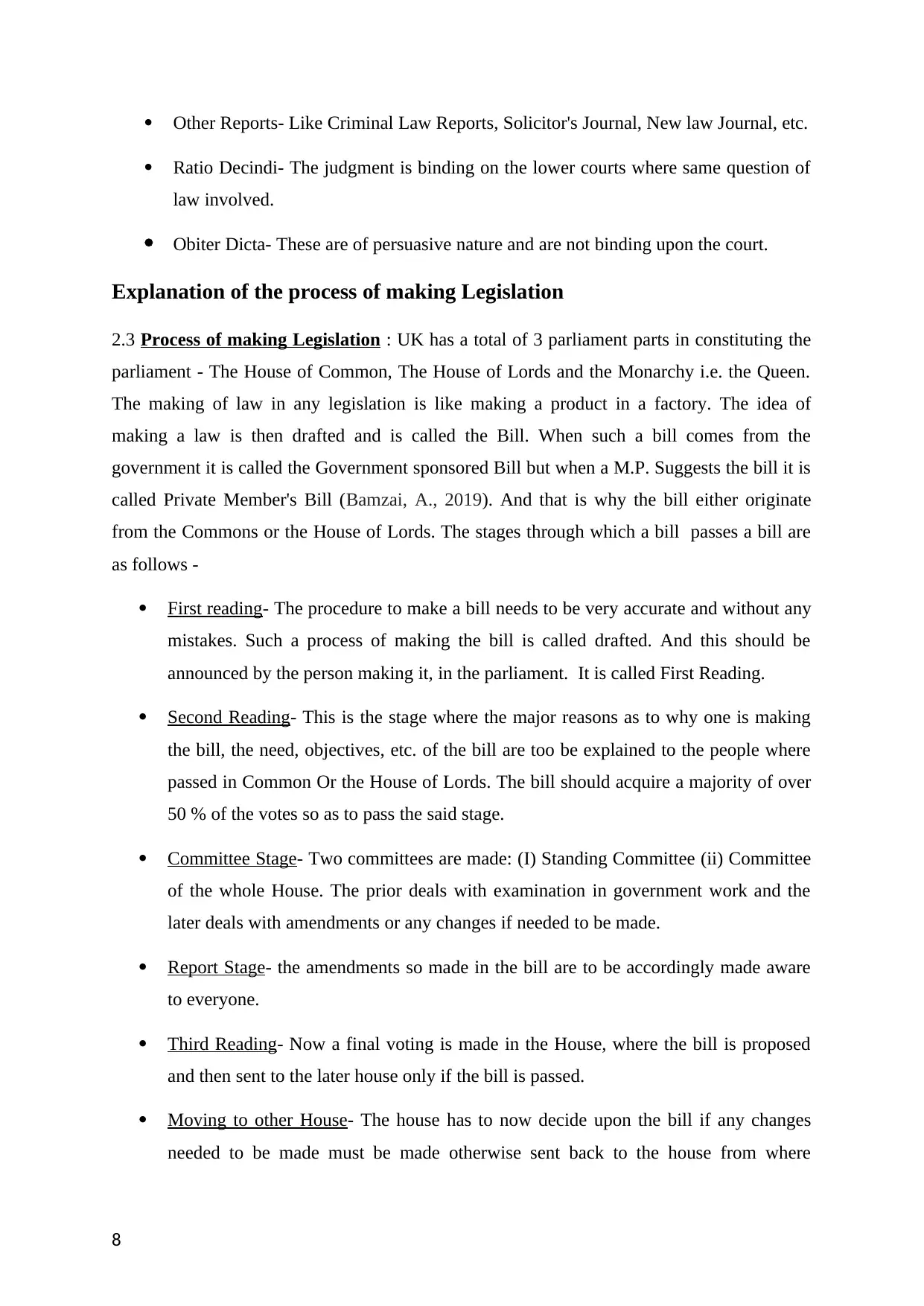
Other Reports- Like Criminal Law Reports, Solicitor's Journal, New law Journal, etc.
Ratio Decindi- The judgment is binding on the lower courts where same question of
law involved.
Obiter Dicta- These are of persuasive nature and are not binding upon the court.
Explanation of the process of making Legislation
2.3 Process of making Legislation : UK has a total of 3 parliament parts in constituting the
parliament - The House of Common, The House of Lords and the Monarchy i.e. the Queen.
The making of law in any legislation is like making a product in a factory. The idea of
making a law is then drafted and is called the Bill. When such a bill comes from the
government it is called the Government sponsored Bill but when a M.P. Suggests the bill it is
called Private Member's Bill (Bamzai, A., 2019). And that is why the bill either originate
from the Commons or the House of Lords. The stages through which a bill passes a bill are
as follows -
First reading- The procedure to make a bill needs to be very accurate and without any
mistakes. Such a process of making the bill is called drafted. And this should be
announced by the person making it, in the parliament. It is called First Reading.
Second Reading- This is the stage where the major reasons as to why one is making
the bill, the need, objectives, etc. of the bill are too be explained to the people where
passed in Common Or the House of Lords. The bill should acquire a majority of over
50 % of the votes so as to pass the said stage.
Committee Stage- Two committees are made: (I) Standing Committee (ii) Committee
of the whole House. The prior deals with examination in government work and the
later deals with amendments or any changes if needed to be made.
Report Stage- the amendments so made in the bill are to be accordingly made aware
to everyone.
Third Reading- Now a final voting is made in the House, where the bill is proposed
and then sent to the later house only if the bill is passed.
Moving to other House- The house has to now decide upon the bill if any changes
needed to be made must be made otherwise sent back to the house from where
8
Ratio Decindi- The judgment is binding on the lower courts where same question of
law involved.
Obiter Dicta- These are of persuasive nature and are not binding upon the court.
Explanation of the process of making Legislation
2.3 Process of making Legislation : UK has a total of 3 parliament parts in constituting the
parliament - The House of Common, The House of Lords and the Monarchy i.e. the Queen.
The making of law in any legislation is like making a product in a factory. The idea of
making a law is then drafted and is called the Bill. When such a bill comes from the
government it is called the Government sponsored Bill but when a M.P. Suggests the bill it is
called Private Member's Bill (Bamzai, A., 2019). And that is why the bill either originate
from the Commons or the House of Lords. The stages through which a bill passes a bill are
as follows -
First reading- The procedure to make a bill needs to be very accurate and without any
mistakes. Such a process of making the bill is called drafted. And this should be
announced by the person making it, in the parliament. It is called First Reading.
Second Reading- This is the stage where the major reasons as to why one is making
the bill, the need, objectives, etc. of the bill are too be explained to the people where
passed in Common Or the House of Lords. The bill should acquire a majority of over
50 % of the votes so as to pass the said stage.
Committee Stage- Two committees are made: (I) Standing Committee (ii) Committee
of the whole House. The prior deals with examination in government work and the
later deals with amendments or any changes if needed to be made.
Report Stage- the amendments so made in the bill are to be accordingly made aware
to everyone.
Third Reading- Now a final voting is made in the House, where the bill is proposed
and then sent to the later house only if the bill is passed.
Moving to other House- The house has to now decide upon the bill if any changes
needed to be made must be made otherwise sent back to the house from where
8
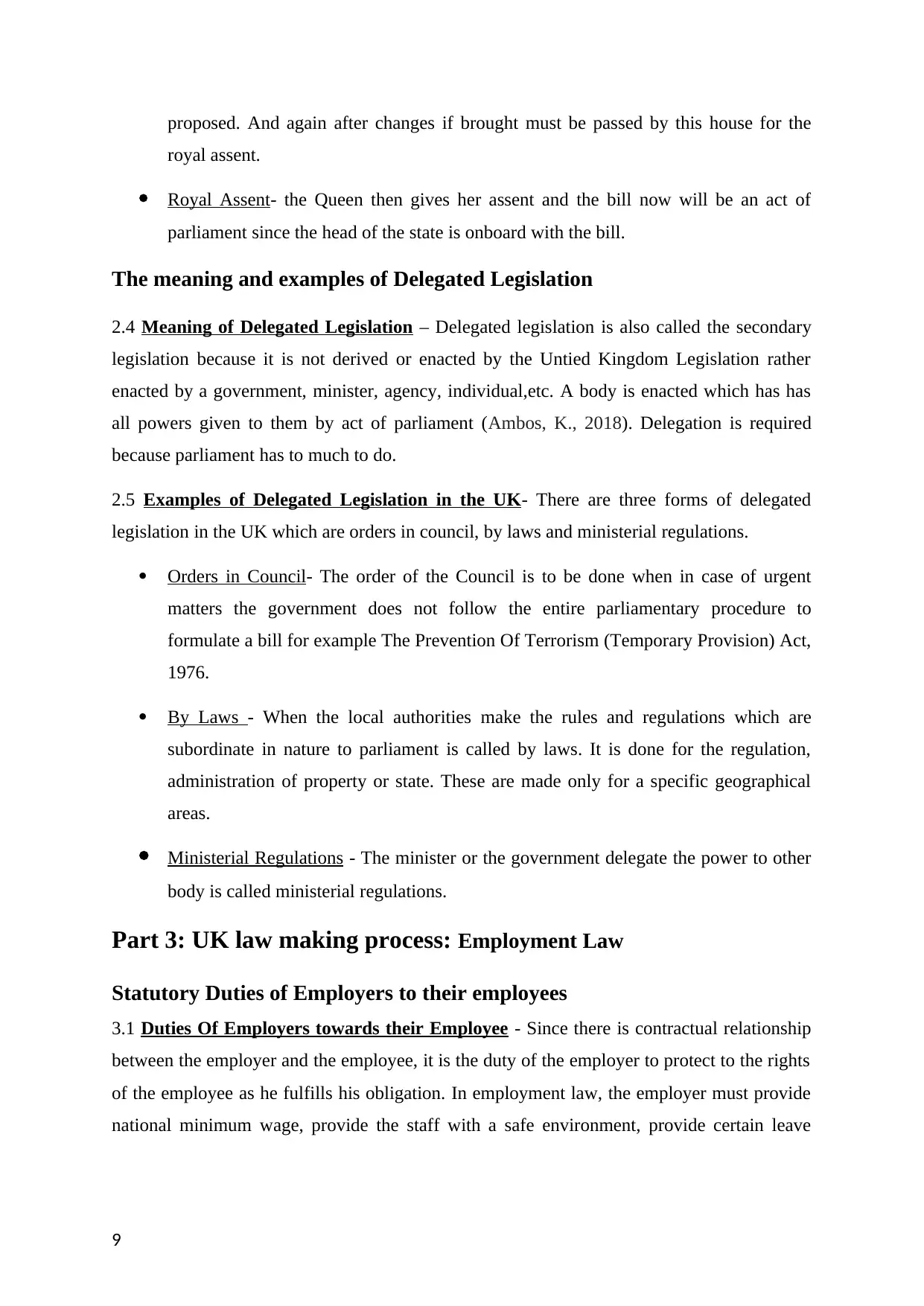
proposed. And again after changes if brought must be passed by this house for the
royal assent.
Royal Assent- the Queen then gives her assent and the bill now will be an act of
parliament since the head of the state is onboard with the bill.
The meaning and examples of Delegated Legislation
2.4 Meaning of Delegated Legislation – Delegated legislation is also called the secondary
legislation because it is not derived or enacted by the Untied Kingdom Legislation rather
enacted by a government, minister, agency, individual,etc. A body is enacted which has has
all powers given to them by act of parliament (Ambos, K., 2018). Delegation is required
because parliament has to much to do.
2.5 Examples of Delegated Legislation in the UK- There are three forms of delegated
legislation in the UK which are orders in council, by laws and ministerial regulations.
Orders in Council- The order of the Council is to be done when in case of urgent
matters the government does not follow the entire parliamentary procedure to
formulate a bill for example The Prevention Of Terrorism (Temporary Provision) Act,
1976.
By Laws - When the local authorities make the rules and regulations which are
subordinate in nature to parliament is called by laws. It is done for the regulation,
administration of property or state. These are made only for a specific geographical
areas.
Ministerial Regulations - The minister or the government delegate the power to other
body is called ministerial regulations.
Part 3: UK law making process: Employment Law
Statutory Duties of Employers to their employees
3.1 Duties Of Employers towards their Employee - Since there is contractual relationship
between the employer and the employee, it is the duty of the employer to protect to the rights
of the employee as he fulfills his obligation. In employment law, the employer must provide
national minimum wage, provide the staff with a safe environment, provide certain leave
9
royal assent.
Royal Assent- the Queen then gives her assent and the bill now will be an act of
parliament since the head of the state is onboard with the bill.
The meaning and examples of Delegated Legislation
2.4 Meaning of Delegated Legislation – Delegated legislation is also called the secondary
legislation because it is not derived or enacted by the Untied Kingdom Legislation rather
enacted by a government, minister, agency, individual,etc. A body is enacted which has has
all powers given to them by act of parliament (Ambos, K., 2018). Delegation is required
because parliament has to much to do.
2.5 Examples of Delegated Legislation in the UK- There are three forms of delegated
legislation in the UK which are orders in council, by laws and ministerial regulations.
Orders in Council- The order of the Council is to be done when in case of urgent
matters the government does not follow the entire parliamentary procedure to
formulate a bill for example The Prevention Of Terrorism (Temporary Provision) Act,
1976.
By Laws - When the local authorities make the rules and regulations which are
subordinate in nature to parliament is called by laws. It is done for the regulation,
administration of property or state. These are made only for a specific geographical
areas.
Ministerial Regulations - The minister or the government delegate the power to other
body is called ministerial regulations.
Part 3: UK law making process: Employment Law
Statutory Duties of Employers to their employees
3.1 Duties Of Employers towards their Employee - Since there is contractual relationship
between the employer and the employee, it is the duty of the employer to protect to the rights
of the employee as he fulfills his obligation. In employment law, the employer must provide
national minimum wage, provide the staff with a safe environment, provide certain leave
9
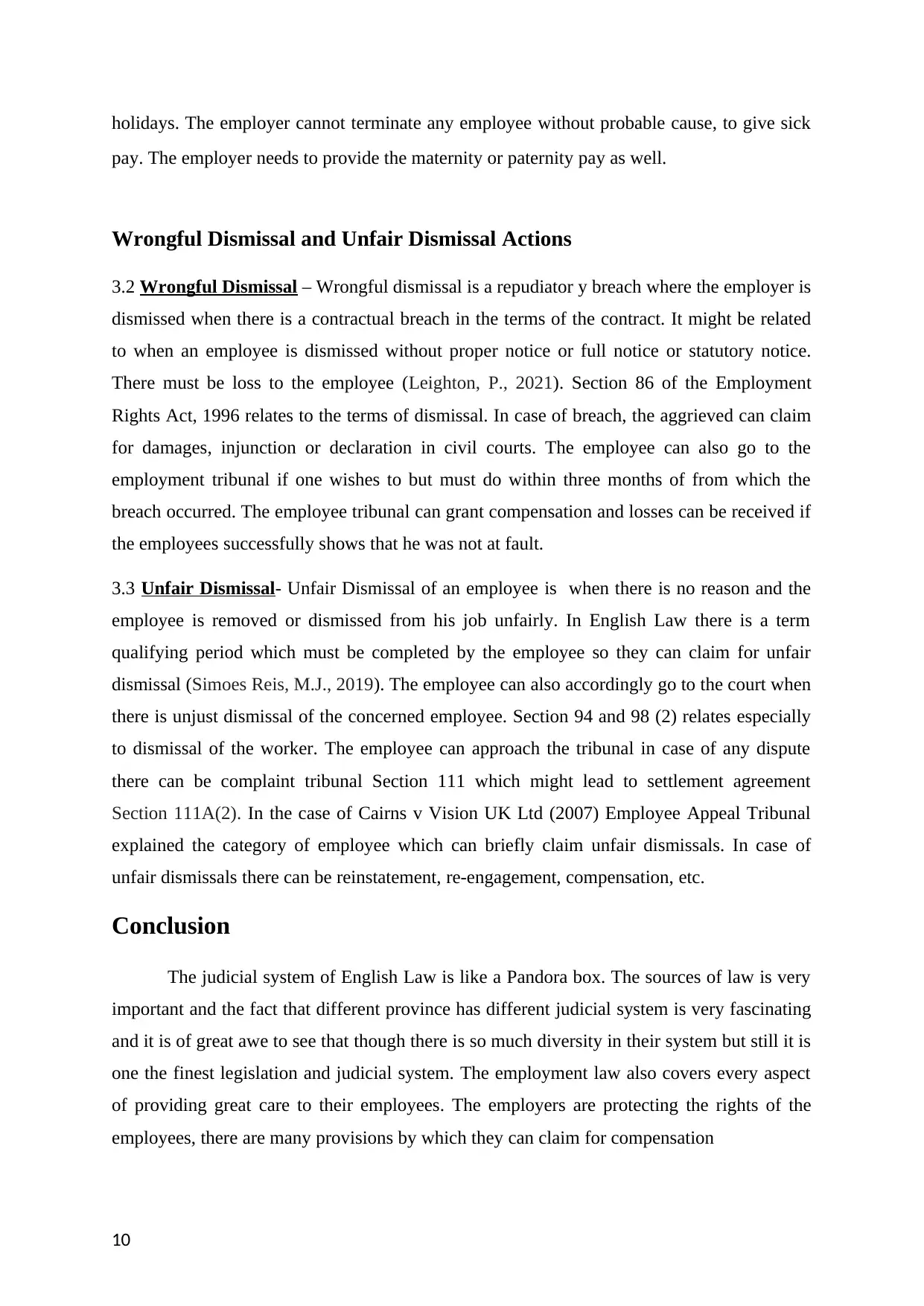
holidays. The employer cannot terminate any employee without probable cause, to give sick
pay. The employer needs to provide the maternity or paternity pay as well.
Wrongful Dismissal and Unfair Dismissal Actions
3.2 Wrongful Dismissal – Wrongful dismissal is a repudiator y breach where the employer is
dismissed when there is a contractual breach in the terms of the contract. It might be related
to when an employee is dismissed without proper notice or full notice or statutory notice.
There must be loss to the employee (Leighton, P., 2021). Section 86 of the Employment
Rights Act, 1996 relates to the terms of dismissal. In case of breach, the aggrieved can claim
for damages, injunction or declaration in civil courts. The employee can also go to the
employment tribunal if one wishes to but must do within three months of from which the
breach occurred. The employee tribunal can grant compensation and losses can be received if
the employees successfully shows that he was not at fault.
3.3 Unfair Dismissal- Unfair Dismissal of an employee is when there is no reason and the
employee is removed or dismissed from his job unfairly. In English Law there is a term
qualifying period which must be completed by the employee so they can claim for unfair
dismissal (Simoes Reis, M.J., 2019). The employee can also accordingly go to the court when
there is unjust dismissal of the concerned employee. Section 94 and 98 (2) relates especially
to dismissal of the worker. The employee can approach the tribunal in case of any dispute
there can be complaint tribunal Section 111 which might lead to settlement agreement
Section 111A(2). In the case of Cairns v Vision UK Ltd (2007) Employee Appeal Tribunal
explained the category of employee which can briefly claim unfair dismissals. In case of
unfair dismissals there can be reinstatement, re-engagement, compensation, etc.
Conclusion
The judicial system of English Law is like a Pandora box. The sources of law is very
important and the fact that different province has different judicial system is very fascinating
and it is of great awe to see that though there is so much diversity in their system but still it is
one the finest legislation and judicial system. The employment law also covers every aspect
of providing great care to their employees. The employers are protecting the rights of the
employees, there are many provisions by which they can claim for compensation
10
pay. The employer needs to provide the maternity or paternity pay as well.
Wrongful Dismissal and Unfair Dismissal Actions
3.2 Wrongful Dismissal – Wrongful dismissal is a repudiator y breach where the employer is
dismissed when there is a contractual breach in the terms of the contract. It might be related
to when an employee is dismissed without proper notice or full notice or statutory notice.
There must be loss to the employee (Leighton, P., 2021). Section 86 of the Employment
Rights Act, 1996 relates to the terms of dismissal. In case of breach, the aggrieved can claim
for damages, injunction or declaration in civil courts. The employee can also go to the
employment tribunal if one wishes to but must do within three months of from which the
breach occurred. The employee tribunal can grant compensation and losses can be received if
the employees successfully shows that he was not at fault.
3.3 Unfair Dismissal- Unfair Dismissal of an employee is when there is no reason and the
employee is removed or dismissed from his job unfairly. In English Law there is a term
qualifying period which must be completed by the employee so they can claim for unfair
dismissal (Simoes Reis, M.J., 2019). The employee can also accordingly go to the court when
there is unjust dismissal of the concerned employee. Section 94 and 98 (2) relates especially
to dismissal of the worker. The employee can approach the tribunal in case of any dispute
there can be complaint tribunal Section 111 which might lead to settlement agreement
Section 111A(2). In the case of Cairns v Vision UK Ltd (2007) Employee Appeal Tribunal
explained the category of employee which can briefly claim unfair dismissals. In case of
unfair dismissals there can be reinstatement, re-engagement, compensation, etc.
Conclusion
The judicial system of English Law is like a Pandora box. The sources of law is very
important and the fact that different province has different judicial system is very fascinating
and it is of great awe to see that though there is so much diversity in their system but still it is
one the finest legislation and judicial system. The employment law also covers every aspect
of providing great care to their employees. The employers are protecting the rights of the
employees, there are many provisions by which they can claim for compensation
10
Secure Best Marks with AI Grader
Need help grading? Try our AI Grader for instant feedback on your assignments.
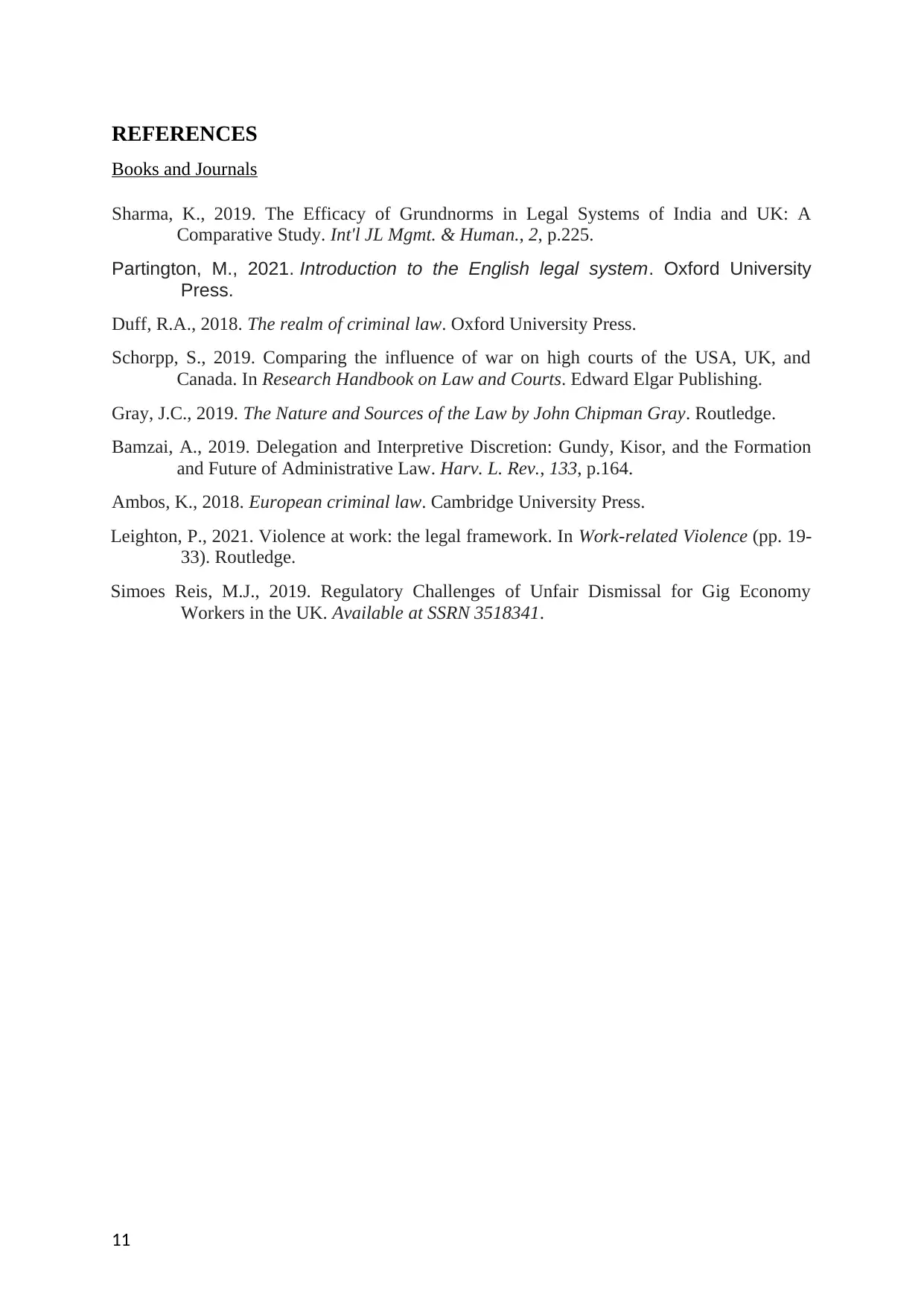
REFERENCES
Books and Journals
Sharma, K., 2019. The Efficacy of Grundnorms in Legal Systems of India and UK: A
Comparative Study. Int'l JL Mgmt. & Human., 2, p.225.
Partington, M., 2021. Introduction to the English legal system. Oxford University
Press.
Duff, R.A., 2018. The realm of criminal law. Oxford University Press.
Schorpp, S., 2019. Comparing the influence of war on high courts of the USA, UK, and
Canada. In Research Handbook on Law and Courts. Edward Elgar Publishing.
Gray, J.C., 2019. The Nature and Sources of the Law by John Chipman Gray. Routledge.
Bamzai, A., 2019. Delegation and Interpretive Discretion: Gundy, Kisor, and the Formation
and Future of Administrative Law. Harv. L. Rev., 133, p.164.
Ambos, K., 2018. European criminal law. Cambridge University Press.
Leighton, P., 2021. Violence at work: the legal framework. In Work-related Violence (pp. 19-
33). Routledge.
Simoes Reis, M.J., 2019. Regulatory Challenges of Unfair Dismissal for Gig Economy
Workers in the UK. Available at SSRN 3518341.
11
Books and Journals
Sharma, K., 2019. The Efficacy of Grundnorms in Legal Systems of India and UK: A
Comparative Study. Int'l JL Mgmt. & Human., 2, p.225.
Partington, M., 2021. Introduction to the English legal system. Oxford University
Press.
Duff, R.A., 2018. The realm of criminal law. Oxford University Press.
Schorpp, S., 2019. Comparing the influence of war on high courts of the USA, UK, and
Canada. In Research Handbook on Law and Courts. Edward Elgar Publishing.
Gray, J.C., 2019. The Nature and Sources of the Law by John Chipman Gray. Routledge.
Bamzai, A., 2019. Delegation and Interpretive Discretion: Gundy, Kisor, and the Formation
and Future of Administrative Law. Harv. L. Rev., 133, p.164.
Ambos, K., 2018. European criminal law. Cambridge University Press.
Leighton, P., 2021. Violence at work: the legal framework. In Work-related Violence (pp. 19-
33). Routledge.
Simoes Reis, M.J., 2019. Regulatory Challenges of Unfair Dismissal for Gig Economy
Workers in the UK. Available at SSRN 3518341.
11
1 out of 11
Related Documents
Your All-in-One AI-Powered Toolkit for Academic Success.
+13062052269
info@desklib.com
Available 24*7 on WhatsApp / Email
![[object Object]](/_next/static/media/star-bottom.7253800d.svg)
Unlock your academic potential
© 2024 | Zucol Services PVT LTD | All rights reserved.
